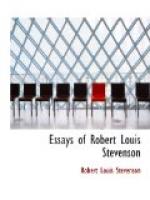ON THE ENJOYMENT OF UNPLEASANT PLACES
It is a difficult matter[1] to make the most of any given place, and we have much in our own power. Things looked at patiently from one side after another generally end by showing a side that is beautiful. A few months ago some words were said in the Portfolio as to an “austere regimen in scenery”; and such a discipline was then recommended as “healthful and strengthening to the taste.” That is the text, so to speak, of the present essay. This discipline in scenery,[2] it must be understood, is something more than a mere walk before breakfast to whet the appetite. For when we are put down in some unsightly neighborhood, and especially if we have come to be more or less dependent on what we see, we must set ourselves to hunt out beautiful things with all the ardour and patience of a botanist after a rare plant. Day by day we perfect ourselves in the art of seeing nature more favourably. We learn to live with her, as people learn to live with fretful or violent spouses: to dwell lovingly on what is good, and shut our eyes against all that is bleak or inharmonious. We learn, also, to come to each place in the right spirit. The traveller, as Brantome quaintly tells us, “fait des discours en soi pour se soutenir en chemin";[3] and into these discourses he weaves something out of all that he sees and suffers by the way; they take their tone greatly from the varying character of the scene; a sharp ascent brings different thoughts from a level road; and the man’s fancies grow lighter as he comes out of the wood into a clearing. Nor does the scenery any more affect the thoughts than the thoughts affect the scenery. We see places through our humours as though differently colored glasses. We are ourselves a term in the equation, a note of the chord, and make discord or harmony almost at will. There is no fear for the result, if we can but surrender ourselves sufficiently to the country that surrounds and follows us, so that we are ever thinking suitable thoughts or telling ourselves some suitable sort of story as we go. We become thus, in some sense, a centre of beauty; we are provocative of beauty,[4] much as a gentle and sincere character is provocative of sincerity and gentleness in others. And even where there is no harmony to be elicited by the quickest and most obedient of spirits, we may still embellish a place with some attraction of romance. We may learn to go far afield for associations, and handle them lightly when we have found them. Sometimes an old print comes to our aid; I have seen many a spot lit up at once with picturesque imaginations, by a reminiscence of Callot, or Sadeler, or Paul Brill.[5] Dick Turpin[6] has been my lay figure for many an English lane. And I suppose the Trossachs would hardly be the Trossachs[7] for most tourists if a man of admirable romantic instinct had not peopled it for them with harmonious figures, and brought them thither




